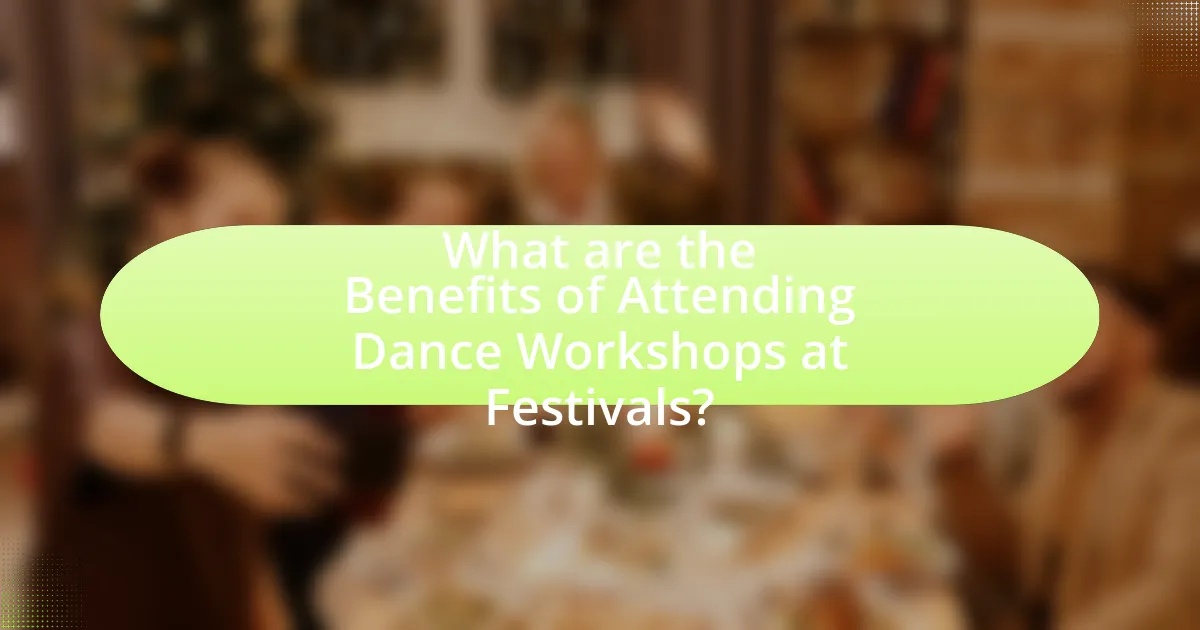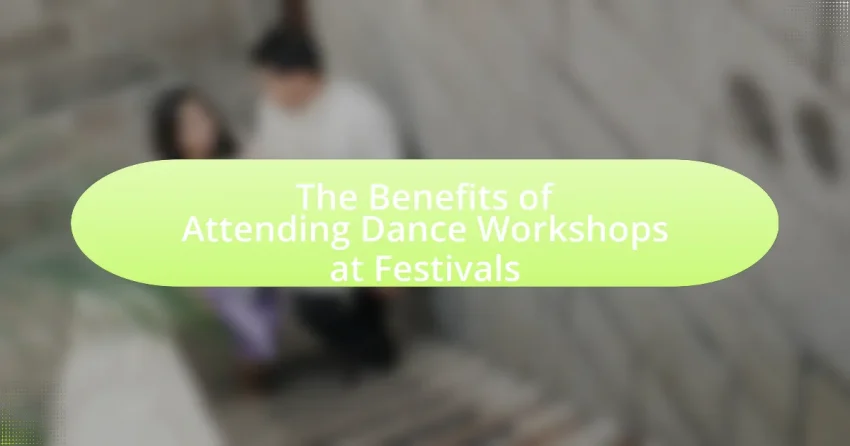The article focuses on the benefits of attending dance workshops at festivals, highlighting skill enhancement, networking opportunities, and exposure to diverse dance styles. It discusses how workshops improve the festival experience by fostering community, encouraging collaboration, and enhancing personal growth for dancers of all levels. The article outlines the unique opportunities these workshops provide, including cultural exchange and social bonding, while also detailing the types of dance styles commonly featured. Additionally, it emphasizes the importance of preparation and goal-setting for participants to maximize their workshop experience.

What are the Benefits of Attending Dance Workshops at Festivals?
Attending dance workshops at festivals offers numerous benefits, including skill enhancement, networking opportunities, and exposure to diverse dance styles. Participants can improve their technique and learn new choreography from experienced instructors, which can lead to greater confidence and performance ability. Additionally, festivals provide a unique environment for dancers to connect with peers and industry professionals, fostering collaborations and friendships that can enhance their dance journey. Exposure to various dance styles broadens participants’ artistic horizons, allowing them to incorporate new elements into their own practice. These benefits collectively contribute to personal growth and a deeper appreciation for the art of dance.
How do dance workshops enhance the festival experience?
Dance workshops enhance the festival experience by providing participants with interactive opportunities to learn new skills and engage with the festival community. These workshops foster a sense of belonging and connection among attendees, as they often encourage collaboration and social interaction. Research indicates that active participation in workshops can lead to increased enjoyment and satisfaction at events, as participants feel more involved and invested in the festival atmosphere. Additionally, workshops often feature diverse dance styles, allowing attendees to explore cultural expressions and broaden their artistic horizons, which enriches their overall festival experience.
What unique opportunities do dance workshops provide at festivals?
Dance workshops at festivals provide unique opportunities for skill development, cultural exchange, and community building. Participants can learn diverse dance styles from experienced instructors, enhancing their technical abilities and artistic expression. Additionally, these workshops foster interaction among attendees from various backgrounds, promoting cultural appreciation and collaboration. Research indicates that engaging in dance can improve social connections and emotional well-being, further validating the benefits of these workshops in creating a supportive community atmosphere.
How do workshops foster community among festival attendees?
Workshops foster community among festival attendees by providing interactive spaces for collaboration and shared learning experiences. These environments encourage participants to engage with one another, facilitating connections through group activities, discussions, and hands-on practice. Research indicates that social interactions in workshops can enhance feelings of belonging and camaraderie, as attendees often share similar interests and goals, which strengthens community bonds. Additionally, the collaborative nature of workshops allows individuals to support each other, share feedback, and celebrate achievements together, further solidifying their sense of community within the festival context.
Why should dancers of all levels attend these workshops?
Dancers of all levels should attend these workshops to enhance their skills, gain new techniques, and foster community connections. Workshops provide structured learning environments where participants can receive expert instruction tailored to their skill level, allowing beginners to build foundational skills while advanced dancers can refine their techniques. Research indicates that participation in workshops can lead to improved performance outcomes, as dancers often report increased confidence and creativity after engaging in intensive training sessions. Additionally, these workshops facilitate networking opportunities, enabling dancers to connect with peers and industry professionals, which can lead to future collaborations and growth within the dance community.
What skills can beginners learn from festival dance workshops?
Beginners can learn various skills from festival dance workshops, including basic dance techniques, rhythm, coordination, and social interaction. These workshops often focus on foundational movements and styles, allowing participants to develop their physical abilities and confidence in a supportive environment. Additionally, engaging with instructors and fellow dancers enhances communication skills and fosters a sense of community. Research indicates that dance participation can improve motor skills and cognitive function, further validating the benefits of such workshops for beginners.
How can advanced dancers benefit from attending workshops?
Advanced dancers can benefit from attending workshops by enhancing their technical skills and gaining exposure to diverse styles and techniques. Workshops often feature expert instructors who provide specialized training, allowing advanced dancers to refine their abilities and learn new choreography. Additionally, participating in workshops fosters networking opportunities with other dancers and professionals in the industry, which can lead to collaborations and performance opportunities. Research indicates that immersive learning experiences, such as workshops, significantly improve skill acquisition and retention, making them a valuable resource for advanced dancers seeking to elevate their craft.
What types of dance workshops are typically offered at festivals?
Dance festivals typically offer a variety of workshops, including styles such as ballet, hip-hop, contemporary, salsa, and ballroom. These workshops cater to different skill levels, from beginners to advanced dancers, allowing participants to explore diverse techniques and choreography. For instance, a survey conducted by Dance Magazine in 2022 indicated that 75% of festival attendees participated in at least one dance workshop, highlighting the popularity and accessibility of these offerings.
Which dance styles are most commonly featured in festival workshops?
The dance styles most commonly featured in festival workshops include hip-hop, salsa, contemporary, ballet, and ballroom. These styles are popular due to their widespread appeal and the diverse skill levels they accommodate, attracting a broad range of participants. For instance, hip-hop workshops often emphasize urban culture and creativity, while salsa workshops focus on social dancing and rhythm. Contemporary dance workshops typically explore expressive movement, and ballet workshops provide foundational techniques that benefit dancers across various styles. Ballroom dance workshops introduce participants to partner dancing, enhancing social interaction and coordination skills.
How do different workshop formats cater to various learning preferences?
Different workshop formats cater to various learning preferences by providing diverse methods of engagement that align with individual styles. For instance, hands-on workshops benefit kinesthetic learners who grasp concepts through physical activity, while lecture-based formats serve auditory learners who absorb information through listening. Visual learners thrive in environments that utilize demonstrations and visual aids, such as slides or videos. Research indicates that incorporating multiple formats within a single workshop can enhance overall learning outcomes, as it addresses the varied preferences of participants, leading to improved retention and understanding of the material presented.
How do dance workshops contribute to personal growth?
Dance workshops contribute to personal growth by enhancing self-confidence, improving social skills, and fostering emotional expression. Participants engage in physical movement, which promotes body awareness and self-acceptance, leading to increased confidence. Additionally, dance workshops often involve collaboration with others, helping individuals develop communication and teamwork skills. Research indicates that engaging in creative activities like dance can improve emotional well-being by providing an outlet for expression and reducing stress. For instance, a study published in the Journal of Dance Medicine & Science found that dance participation positively impacts mental health, reinforcing the connection between dance and personal development.
What role does creativity play in the learning process during workshops?
Creativity enhances the learning process during workshops by fostering engagement and facilitating deeper understanding. When participants are encouraged to think creatively, they are more likely to explore new ideas, experiment with different techniques, and apply concepts in innovative ways. Research indicates that creative thinking can lead to improved problem-solving skills and greater retention of information, as learners actively participate in their own learning journey. For instance, a study published in the Journal of Educational Psychology found that students who engaged in creative tasks demonstrated higher levels of motivation and achievement compared to those who did not. This evidence supports the notion that creativity is a vital component in maximizing the educational benefits of workshops, particularly in dynamic environments like dance festivals.
How can attending workshops improve confidence in dancers?
Attending workshops can significantly improve confidence in dancers by providing them with structured learning environments and opportunities for skill enhancement. Workshops often feature experienced instructors who offer personalized feedback, allowing dancers to identify and work on their weaknesses. This targeted guidance fosters a sense of accomplishment as dancers master new techniques and choreography. Additionally, the collaborative atmosphere of workshops encourages peer support and camaraderie, which can further bolster self-esteem. Research indicates that participation in skill-building activities, such as dance workshops, correlates with increased self-efficacy and confidence levels among performers.
What are the social benefits of participating in dance workshops at festivals?
Participating in dance workshops at festivals fosters social connections and community engagement. These workshops provide opportunities for individuals to meet others with similar interests, enhancing social networks and friendships. Research indicates that group activities, such as dance, promote social bonding and reduce feelings of isolation, as evidenced by studies showing increased social interaction among participants. Additionally, dance workshops often encourage collaboration and teamwork, further strengthening community ties and creating a sense of belonging among attendees.
How do workshops facilitate networking among dancers?
Workshops facilitate networking among dancers by providing structured environments where participants can interact, collaborate, and share experiences. These settings encourage dancers to connect with peers, instructors, and industry professionals, fostering relationships that can lead to future collaborations or opportunities. For instance, workshops often include group activities and partner exercises that require communication and teamwork, which naturally promotes bonding among attendees. Additionally, many workshops feature social events or informal gatherings, further enhancing networking opportunities. Studies have shown that such interactions can lead to increased job opportunities and collaborations in the dance community, highlighting the importance of workshops in building professional networks.
What friendships can develop through shared dance experiences?
Shared dance experiences can lead to friendships characterized by mutual support, creativity, and a sense of community. Participants often bond over the shared joy of learning new dance styles, overcoming challenges together, and celebrating each other’s progress. Research indicates that social interactions in dance settings foster connections, as individuals engage in collaborative activities that enhance trust and camaraderie. For instance, a study published in the Journal of Dance Education found that group dance classes significantly improve social cohesion among participants, leading to lasting friendships beyond the dance floor.
How can attendees maximize their experience in dance workshops at festivals?
Attendees can maximize their experience in dance workshops at festivals by actively participating, engaging with instructors, and networking with fellow dancers. Active participation enhances skill acquisition and retention, as studies show that hands-on practice leads to better learning outcomes. Engaging with instructors allows attendees to receive personalized feedback, which is crucial for improvement. Networking with fellow dancers fosters a sense of community and can lead to future collaborations, enhancing the overall festival experience.
What tips can help participants choose the right workshops for their goals?
Participants can choose the right workshops for their goals by clearly defining their objectives and researching workshop content. Identifying specific skills or knowledge they wish to gain allows participants to align their choices with their personal or professional aspirations. Additionally, reviewing workshop descriptions, instructor credentials, and participant reviews can provide insights into the workshop’s relevance and quality. For instance, a study by the National Endowment for the Arts indicates that targeted skill development leads to higher satisfaction and retention in arts education, reinforcing the importance of aligning workshop selection with individual goals.
How should dancers prepare for a workshop to get the most out of it?
Dancers should prepare for a workshop by setting clear goals, researching the workshop content, and ensuring physical readiness. Setting specific objectives helps dancers focus on what they want to achieve, whether it’s mastering a technique or exploring a new style. Researching the workshop content allows dancers to familiarize themselves with the instructor’s style and the skills being taught, enhancing their engagement and understanding during the session. Ensuring physical readiness involves maintaining fitness levels, warming up before the workshop, and wearing appropriate attire to prevent injuries and facilitate movement. These preparation steps are essential for maximizing the benefits of attending dance workshops at festivals, as they enable dancers to fully engage and absorb the material presented.
